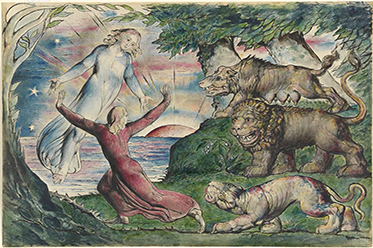 The National Gallery of Victoria will showcase its acclaimed William Blake collection, providing the first opportunity in fifteen years to see more than 100 works by Blake including spectacular watercolours, single prints and illustrated books.
The National Gallery of Victoria will showcase its acclaimed William Blake collection, providing the first opportunity in fifteen years to see more than 100 works by Blake including spectacular watercolours, single prints and illustrated books.
Especially rich in the representation of the artist’s late years, the NGV Collection boasts 36 of the 102 watercolours illustrating The Divine Comedy by Dante, the largest number of works from this celebrated series held by any gallery in the world.
An artist and poet of outstanding originality, Blake used drawing and print media to express his own visionary universe, as well as those of authors such as Dante and Milton. His radiant watercolours and printed illustrations remain some of the most inspired and innovative images of the Romantic era and assured his status as a seminal figure of the period.
“The NGV’s holdings of Blake are only infrequently exhibited due to the material’s light sensitivity and it’s wonderful to be able to put them on display again,” says Tony Ellwood, Director, NGV.
“It’s likely that the works won’t be seen again for another decade so I encourage visitors to take up this opportunity to experience Blake’s dramatic and evocative imagery.”
The exhibition will feature the 36 Dante watercolours that Blake executed in the three years prior to his death in 1827 which show the artist at the height of his powers. These works are regarded as one of the NGV’s greatest treasures; they were purchased in 1918 through the Felton Bequest, together with a further 27 key works by the artist from the famous Linnell sale in London.
William Blake will include early works by the artist as well as works dating from the last years of his life. Blake’s early career is represented through a selection of his reproductive engravings, as well as a beautiful copy of one of his earliest illuminated books of his own poetry, The Songs of Innocence of 1789. This book, together with his Prophetic Books of the 1790s and early 1800s, exemplify the uniquely original system for printing Blake devised for the production of his illustrated books of poetry.
William Blake will also include two print series executed by the artist in his late years, both of which are startlingly original in the handling of their respective media. Blake’s wood-engravings illustrating Thornton’s publication of Virgil’s poetry (1821) brilliantly capture the variously pastoral or melancholy moods of the text in images bursting with intensity and a freedom previously unknown in this medium.
The Book of Job cycle of engravings (1823–26) presents Blake’s personal and multi-layered interpretation of the Biblical narrative in images of great beauty and unconventionality.
A range of public programs will be presented including a keynote lecture on Saturday 5 April from Professor Peter Otto, The University of Melbourne, titled William Blake in the 21st century.
This lecture will introduce Blake as artist, poet, and prophet by mapping his attempts to transform traditional understandings of the book, discussing how his radical methods can also be seen at home in the early 21st century. The lecture will be followed by a curator floor talk in the exhibition space by Cathy Leahy, Senior Curator of Prints and Drawings.
William Blake
NGV International, St. Kilda Road, Melbourne
Exhibition: 4 April to 31 August 2014
Free entry
For more information, visit: www.ngv.vic.gov.au for details.
Image: William Blake, English 1757–1827, Dante running from the Three Beasts illustration to The Divine Comedy by Dante Alighieri (Inferno I, 1-90), 1824–1827, pen and ink and watercolour over pencil, Butlin, 812.1; Butlin & Gott, 337.0 x 52.8 cm (sheet) National Gallery of Victoria, Melbourne, Felton Bequest, 1920
